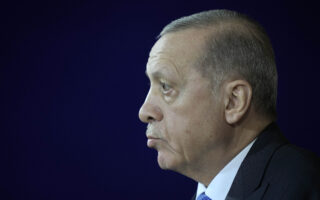Use of UAVs will ‘almost certainly’ increase, says strategic studies professor

“The use of unmanned devices in the air, at sea and on land is almost certainly going to increase,” Andrew Novo, professor of strategic studies at the National Defense University, Washington, DC tells Kathimerini in an interview. On the sidelines of the lecture “We Have Good Allies: Allies and decisions for war and peace in Thucydides,” organized by the Institute of International Relations (IDIS) in Athens, Professor Novo points out to Kathimerini that the human factor is unable to assimilate technological developments. “Pilots are already at their physical limits flying in the current generation of combat aircraft,” Dr Novo stresses, adding that “as technology continues to advance, unmanned combat aircraft will be necessary because human pilots will not be physically capable of flying them.”
Extending the discussion to the Ukrainian battlefields, Novo, a fellow at Johns Hopkins and Georgetown universities, notes that Ukrainian forces managed to maintain defensive lines by taking advantage of Western assistance while, regarding the inability to retake occupied territories, he exposes the Russian fortification of defensive zones within Ukrainian territory as a cause of failure, although his views do not represent those of the National Defense University, the Department of Defense, or the US government.
“I think if Ukrainian troops began to have large-scale success on the offensive, there would be the danger that Russia would escalate further,” says the distinguished academic, noting that neither the European Union nor NATO have expressed a willingness to put troops on the battlefield. In the same vein, the military analyst explains to Kathimerini that the possible deployment of troops from third countries would create a “signaling game” and that “the escalation risk is too high.” However, he adds that “Russia has continually warned Western nations against providing more and more weapons to Ukraine.”
Moving further south and to the Eastern Mediterranean, Novo praises Greece’s composure and – given Turkish President Recep Tayyip Erdogan’s unstable character with his “neutral” stance on Ukraine and the purchase of the S-400 missile system – states that the “keyword” in American foreign policy has always been “stability.” Going deeper into this geostrategic perception, Dr Novo points out that foreign policy makers recognize that Erdogan’s actions are contrary to the strategy of stability, citing the examples of “numerous provocations against Cyprus and Greece,” the “instrumentalization of refugees,” and “military interventions in Syria, Iraq and Libya.” Instead, he points out, “Greece, in contrast, has been a source of stability. Capable leadership and collaborative intentions have resulted in relations between Greece and the United States being positive across the board.”
Focusing on the broadening of strategic alliances for Greece in addressing instability in the Eastern Mediterranean, Novo notes that “for a country like Greece, strengthening alliances with its European partners is the surest protection against Turkish aggression since American responses to Turkey are often handcuffed by Turkey’s position within NATO.” He also points out that “cooperation between these Mediterranean nations (Greece, France and Italy) helps across a range of issues, including… continued conflict in Libya, instability in Egypt, and the broader issue of migration. There is a common narrative for stability, democracy and security among Southern European nations. Turkey could contribute to this, but, under Erdogan’s rule has often acted in a more unsettling way.”






